 Petzlover
Petzlover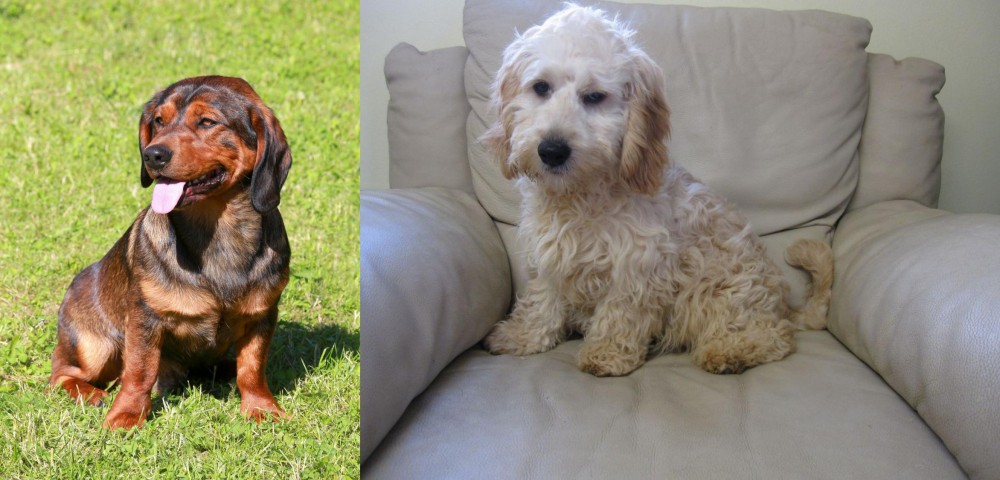 Alpine Dachsbracke is originated from Austria but Cockachon is originated from United States. Both Alpine Dachsbracke and Cockachon are having almost same height. Alpine Dachsbracke may weigh 9 kg / 20 pounds more than Cockachon. Alpine Dachsbracke may live 3 years less than Cockachon. Both Alpine Dachsbracke and Cockachon has almost same litter size. Alpine Dachsbracke requires Moderate Maintenance. But Cockachon requires Low Maintenance
Alpine Dachsbracke is originated from Austria but Cockachon is originated from United States. Both Alpine Dachsbracke and Cockachon are having almost same height. Alpine Dachsbracke may weigh 9 kg / 20 pounds more than Cockachon. Alpine Dachsbracke may live 3 years less than Cockachon. Both Alpine Dachsbracke and Cockachon has almost same litter size. Alpine Dachsbracke requires Moderate Maintenance. But Cockachon requires Low Maintenance
 They are aggressive enough for hunting and tracking large animals as well as small, but they are gentle enough to bring an injured animal back to the hunter without hurting it more.
They are aggressive enough for hunting and tracking large animals as well as small, but they are gentle enough to bring an injured animal back to the hunter without hurting it more.
At one time the breed was a crown favorite, accompanying Prince Rudolph of Habsburg on his hunting excursions. The Alpine Dachsbracke is still a favorite hunting breed but is now more often found as a family pet.
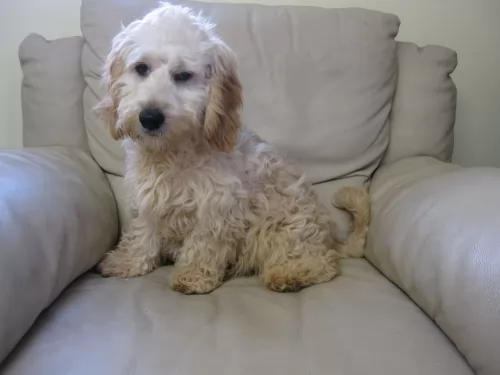 The Cockachon is not a pure bred dog but rather a cross between the Cocker Spaniel and the Bichon Frise. Very little if anything is known about who initially developed the Cockachon. It is known that the International Designer Canine Association (IDCA)registered and recognized the hybrid in 2009.
The Cockachon is not a pure bred dog but rather a cross between the Cocker Spaniel and the Bichon Frise. Very little if anything is known about who initially developed the Cockachon. It is known that the International Designer Canine Association (IDCA)registered and recognized the hybrid in 2009.
It is obviously a relatively new cross breed. The hybrid is also recognized by the American Canine Hybrid Club (ACHC), International Designer Canine Registry (IDCR) and the Designer Dog Kennel Club (DDKC).
 The Alpine Dachsbracke is a short, stocky dog with a long body and short legs. It is big boned and robust with round eyes. It has black toenails and a short, dense red or black coat.
The Alpine Dachsbracke is a short, stocky dog with a long body and short legs. It is big boned and robust with round eyes. It has black toenails and a short, dense red or black coat.
The bridge of his nose is straight with a strong muzzle. Its forehead has a well defined furrow and black lips and nose. He is muscular and his chest is broad and deep. He holds his tail high and has a trotting gait.
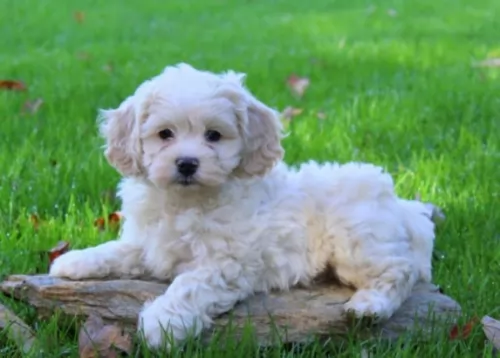 The Cockachon is a cute, little dog very popular in current times. He is small, compact, dark eyes, a round head and black nose. He has a baby face and fluffy hair. It has a furry tail and a blunt muzzle.
The Cockachon is a cute, little dog very popular in current times. He is small, compact, dark eyes, a round head and black nose. He has a baby face and fluffy hair. It has a furry tail and a blunt muzzle.
The Cockachon is a mix between the American Cocker Spaniel and the Bichon Frise. In order to get a better idea of what the hybrid can look like just look at the individual parents. The American Cocker Spaniel is a small dog with a short muzzle and domed head. It is in the Sporting Group, but it is the smallest member of the group. He has a compact, sturdy body and though domed his head is refined.
The Cocker’s stance includes a sloping topline, muscular hindquarters and strong shorter legs adds up to a balanced canine. The coat can be in a wide variety of colors including liver, golden, black, and red. Also, it could be liver and tan, black and tan, roan or tricolors. So, while the Bichon Frise is always white the Cockachon can be any of these colors including white. The types of coats that the Cocker Spaniel and the Bichon Frise have are very different as well.
The Bichon Frise is also a small dog, actually smaller than the American Cocker. The Cockachon usually ends up being about the size of the Bichon at 5-10 kg in weight and 23-30 cm in height. The skull of the Bichon Frise is round rather than domed and the muzzle is also rounded. The tail is long and curly while the Cocker would usually have a cropped tail. The nose and eyes of the Bichon Frise are black and its hair is dense and curly. Unlike the Cocker Spaniel it barely sheds.
Many Cockachon have floppy ears, curly coats and come in any variety of colors though many, many are white.
 The Alpine Dachsbracke is a very lovable family dog even though he was bred to hunt and scent. They are great with kids and at their size are still good apartment, inside dogs. Though they need daily exercise they don’t need a large fenced in yard.
The Alpine Dachsbracke is a very lovable family dog even though he was bred to hunt and scent. They are great with kids and at their size are still good apartment, inside dogs. Though they need daily exercise they don’t need a large fenced in yard.
They are brave, intelligent and with a lot of stamina for the hunt or the walk. Take them on a hunting trip and they will adore you for it. Though they have plenty of power and endurance, they are not aggressive. However they are fearless and proud and need a strong pack leader for their human companion.
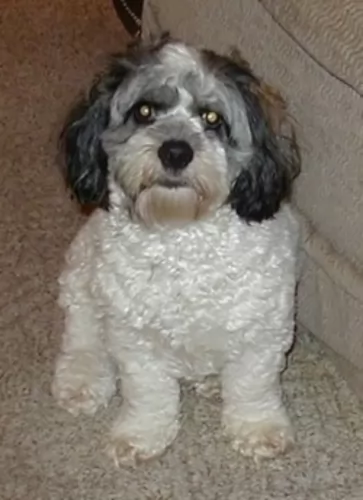 People created the Cockachon to get a small, lap or carry dog that had certain characteristics. These characteristics included a very social, loving dog. He is active and friendly, sweet and gentle. He is loyal, and loves being loved. He is great with other dogs and you can trust him with your children. He is a little independent but very loyal.
People created the Cockachon to get a small, lap or carry dog that had certain characteristics. These characteristics included a very social, loving dog. He is active and friendly, sweet and gentle. He is loyal, and loves being loved. He is great with other dogs and you can trust him with your children. He is a little independent but very loyal.
Like many little dogs he can have serious separation anxiety. Crate training is recommended so that he has a place to feel safe when you are not with him.
 They were bred to hunt and so are active dogs needing daily exercise and long walks.
They were bred to hunt and so are active dogs needing daily exercise and long walks.
They are at risk for back problems being long-backed dogs. The most common type of back problem is Intervertebral Disc Disease. This can cause pain and paralysis and can be caused by jumping, obesity or intense exercise.
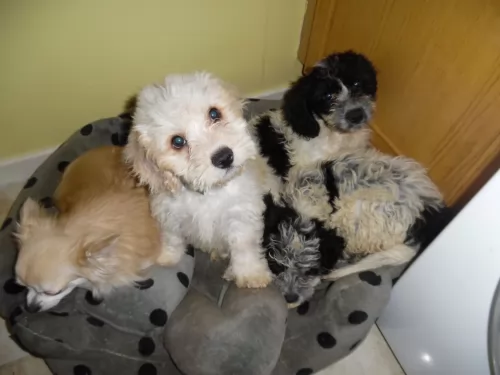 Hybrid dogs seldom have a lot of inherited diseases as they seem to jump a generation but if they do, it can be either a combination of both breeds issues or issues from just one of the breeds in the cross. For the Cockachon these issues include:
Hybrid dogs seldom have a lot of inherited diseases as they seem to jump a generation but if they do, it can be either a combination of both breeds issues or issues from just one of the breeds in the cross. For the Cockachon these issues include:
This loose kneecap issue is common to many small dogs and can cause lameness if not addressed.
Eyelid problems such as the ones that might bother a Cockachon can be found in many small dogs. These include Entropion and Ectropion.
 Whether a puppy or adult the breed is subject to obesity and needs to be fed a good, vitamin filled dry dog food. At the same time they need the calories if they are active or hunting.
Whether a puppy or adult the breed is subject to obesity and needs to be fed a good, vitamin filled dry dog food. At the same time they need the calories if they are active or hunting.
About one quarter to one half cup twice a day.
About one half cup twice a day until they become seniors or less active then reduce to a fourth of a cup twice a day.
The Alpine Daschbracke was bred to work. He needs exercise at least a couple times a day.
This breed is playful and loves to find and retrieve. Daily exercise is essential.
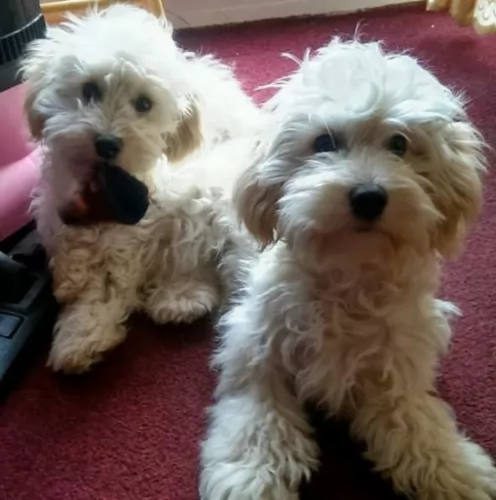 Don’t overfeed a Cockachon. Give him ¾ -1.5 cups of dry food of high quality in two meals per day.
Don’t overfeed a Cockachon. Give him ¾ -1.5 cups of dry food of high quality in two meals per day.
In addition to the issues listed above, the Cockachon is also prone to heart disease and cardiac issues.
The Cockachon has a lot of energy for its size. Make sure it gets plenty of exercise. If walks are the exercise of your choice make sure you walk him for 30 minutes a day. He loves to play, and a back yard would be nice. These little guys do well in obedience but are usually to small for agility.